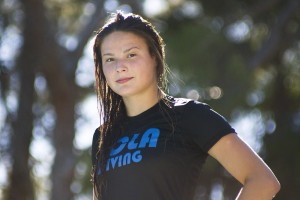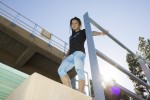Maria Polyakova constantly checked her email waiting for a response from the diving coaches at Stanford, Texas, USC and UCLA. She waited weeks for responses from the first three schools, but it only took three days for UCLA diving coach Tom Stebbins to reply.
“I was very lucky,” Stebbins said. “(Stanford and Texas) essentially said no right away and that left just us and USC. We were lucky in that we had scholarships available and we had the right mix of academics and athletics.”
Recruiting foreign divers is an unusual practice for NCAA diving coaches, as only a few schools have actively recruited outside the United States. Then-Stanford coach Rich Schavone rejected Polyakova because he had never taken an international diver and Texas lacked the ability to offer her scholarship money.
At 16 years old, Polyakova was already one of the best female divers in Russia. She became the first international diver to join the Bruins during Stebbins’ 18-year coaching career and has quickly become one of the best divers in school history.
The biggest factor behind her decision to come to the United States was her desire to continue her education.
“Here I can get both an education and a place that I can practice,” Polyakova said. “In Russia, I could only do either-or.”
Polyakova’s parents had her follow in her brother’s footsteps and begin diving at the age of 5. Before coming to UCLA last fall, she spent the previous 12 years training in Penza and Moscow.
Coaching Polyakova hasn’t been without its difficulties, as Stebbins has had to adapt his diving philosophy in order to incorporate some of the principles that Polyakova learned in Russia.
“That challenge has been great. Maria’s system is one where they don’t do any weights,” Stebbins said. “They do a lot of plyometrics (and) a ton of tumbling and acrobatics outside the pool. With her, we’ve tried to maintain that as best as we can.”
For Polyakova, the most notable difference between diving here and in Russia hasn’t been technique, but instead the Southern California weather. During the first week of February, the temperature in Los Angeles hovered around the high 70s while the average temperature in Moscow was in the mid 30s.
The vast contrast in temperatures is important because, unlike in Russia, most aquatic centers in Southern California aren’t enclosed. This caused Polyakova to have to adjust to diving with the wind blowing or the sun in her face, something that she hadn’t experienced in Russia.
Off the boards, the team has helped Polyakova jump headfirst into American culture.
“We would always have dinner and try and get the pronunciation (of words) right,” said sophomore Ciara Monahan. “She’s the type of person that really wanted to learn about America and she’s really embraced everything.”
This year, Polyakova has established herself as the best diver in the conference by winning 11 of 12 springboard events and earning Pac-12 Diver of the Month in both November and December.
“What I value – and I think all coaches do – is consistent play, training and behavior,” Stebbins said. “She is a model of that. She brings her best effort everyday.”

At last year’s NCAA championship, Polyakova placed fourth in the 3-meter dive by obliterating the previous UCLA school record. She also came close to beating former UCLA diver Marisa Samaniego’s 1-meter record as well.
“I think it’s a matter of time (before she breaks it). I hope she does what she did to the 3-meter record,” Stebbins said. “I think the last record was at like 325 or 327 and she pushed that number to 390. That’s almost like adding a dive to your routine.”
With the 2016 Summer Olympics in Rio de Janiero this year, Polyakova is firmly set on competing for a spot on the Russian team.
“For her, I truly believe she’s an Olympic medalist waiting to happen,” Stebbins said. “I value consistency, I value work ethic, I value talent and determination and she has all of those things. She’s going to have her opportunity (since) she’s still really young.”
Polyakova won her first 1-meter championship at the European Games in Bakubut, even having a solid performance on the 3-meter there. And Just last week she was within five points of winning at a Russian national meet.
It is her hope, she said, that this kind of international and national success will be able to translate at the Russian Olympic trials this June in Penza, where she needs a top three finish. If she does, she’ll qualify for the Olympics and be on the way toward accomplishing her aspirations.
“That’s my dream,” Polyakova said. “Not only to compete but also to win a medal.”
